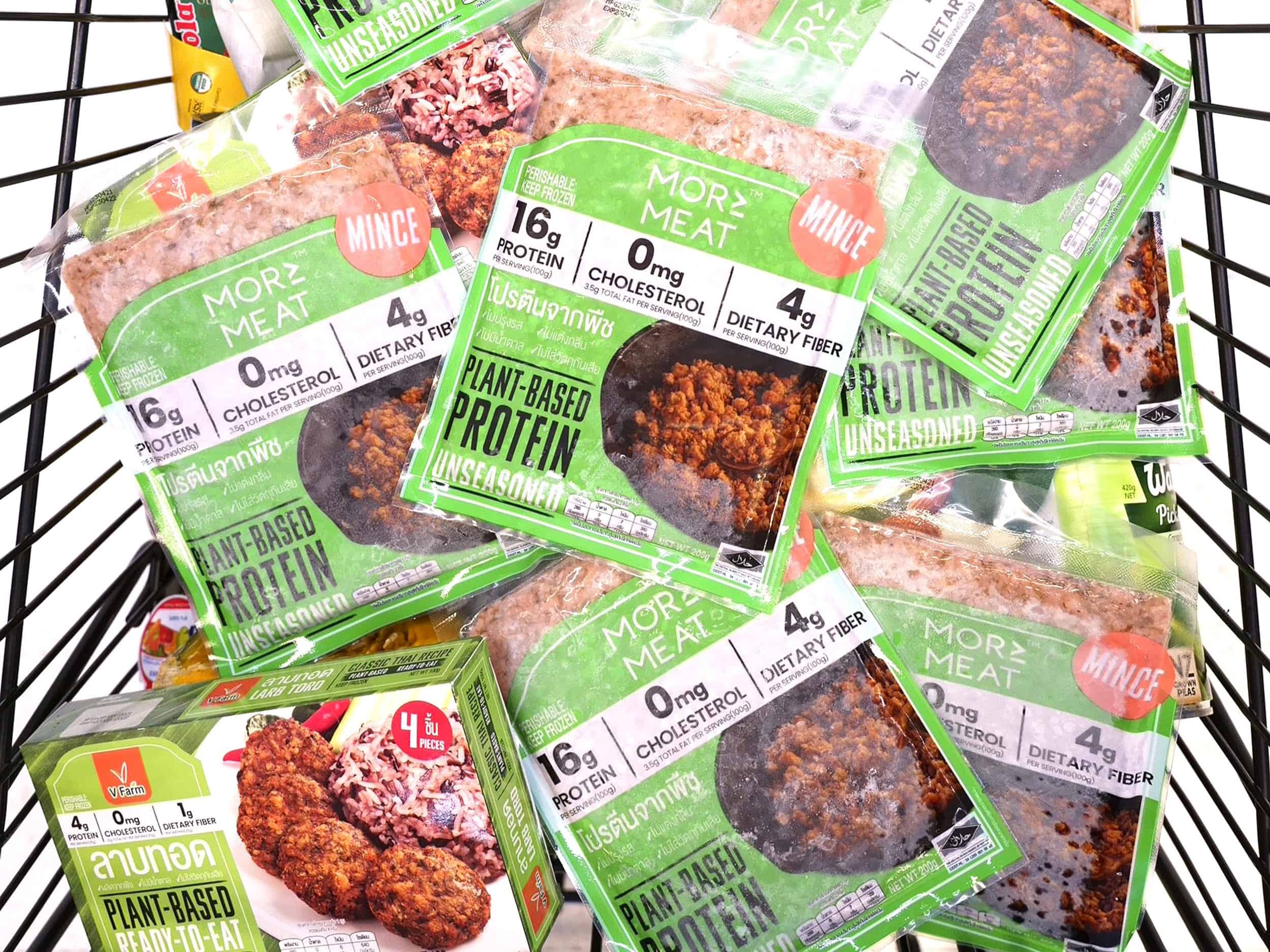7 Mins Read
Two-thirds of Thailand’s population wants to eat less meat over the next two years and replace it with plant-based alternatives, according to a new survey. Health and nutrition are the main motivators, while price and availability remain key barriers.
While three-quarters of people in Thailand eat meat and 18% are already reducing their intake, two-thirds are hoping to cut their consumption of animal proteins in the next two years, according to a new survey conducted by Madre Brava through Northstar/HarrisX.
Polling more than 1,500 consumers in Thailand, the research found that respondents in Thailand – only 1% of whom are vegan and 2% vegetarian – would like to replace meat with either traditional plant proteins (44%) or novel alternatives (29%), as well as a mix of both (28%). And health is the primary driver for this decision, followed by the environment and animal welfare.
Environmental issues less concerning for Thai consumers
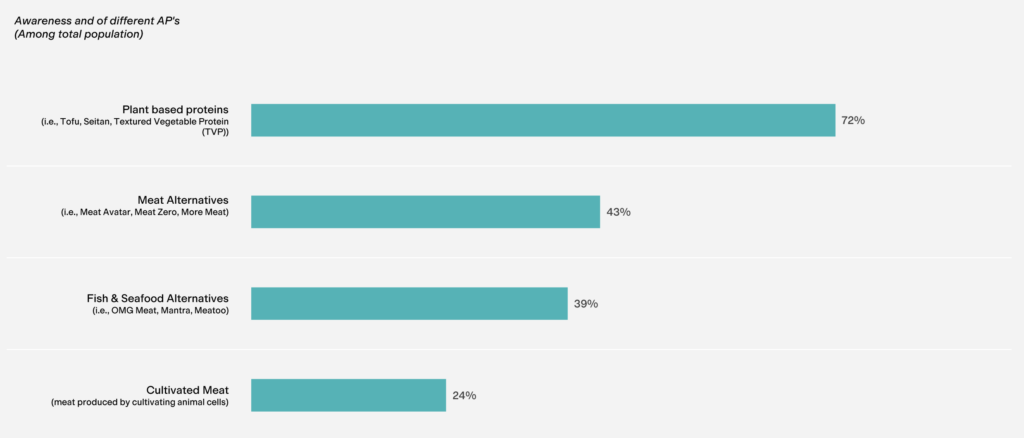
The research revealed that awareness of both traditional plant proteins (like tofu, seitan, TVP and beans) and meat alternatives is high, with 72% familiar with the former and 43% with the latter. Similarly, 39% have heard of vegan seafood, despite a lower number of people intending to reduce conventional fish consumption over the next two years (49%).
Among the consumers who have tried alternative proteins (89%), 41% are looking to increase their intake of these products, while 16% want to reduce it. Of the 11% who haven’t eaten alt-proteins, 63% want to up their consumption.
Health is paramount for Thais, with both negative and positive associations of alt-proteins highlighting this factor: 63% believe meat alternatives are healthier, but 70% find them too processed. Price and taste are key too, with 64% associating them with a higher cost than animal-derived meat and 56% saying they don’t taste as good.
“From the latest numbers, it is clear that Thai consumers are a group that places high importance on health compared to many other countries, and are aware that reducing meat and consuming plant-based protein instead will have a positive effect,” said Jacques-Chai Chomthongdi, Southeast Asia director at Madre Brava.
“This coincides with environmental imperatives, especially climate change, due to the high greenhouse gas emissions of animal protein production,” he added. It’s something echoed by Thailand’s consumers, with 72% calling plant-based meat better for the environment than its conventional counterpart.
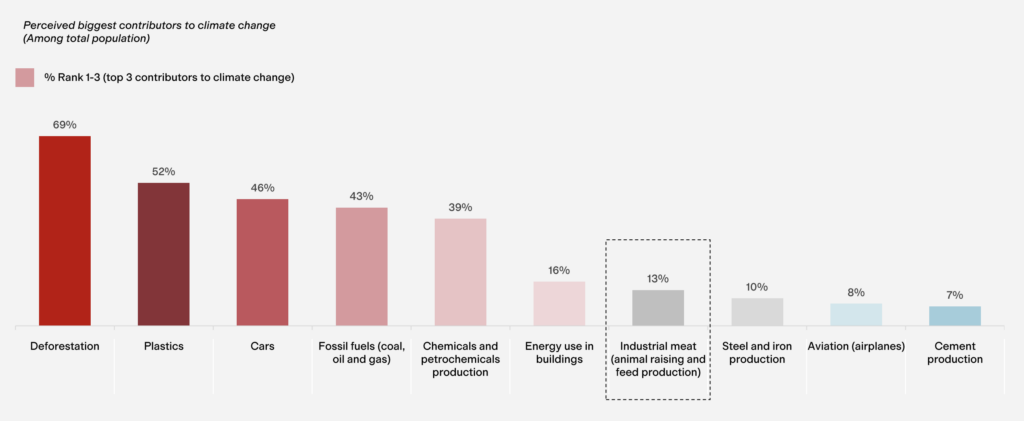
But despite that, environmental issues are a less pressing concern for Thai consumers than health and wellbeing, poverty, and the cost-of-living crisis. And when it comes to climate change, respondents see deforestation (69%) and plastic use (52%) as the main causes, with only 13% finding industrial meat as a major driver. This is because four in 10 Thai people don’t know a lot about the animal agriculture industry, which is responsible for 11-19.5% of global emissions.
The survey also compared Thai attitudes towards meat-eating with global markets (UK, France, Germany, US and Brazil), finding that the average number of people who believe they’ll reduce or stop eating meat in the next two years is 46%, versus 67% for Thailand. Conversely, while only 9% of Thai people say they will not be eating alt-protein in this timeframe, it’s much lower than the international average of 27%.
Among the 33% of survey respondents who don’t intend to cut their meat consumption, around a third say it’s because meat-eating is normal and ubiquitous, and necessary for our health. A further 18% say it’s natural (“humans have been doing it forever”), and 14% find it pleasurable. This is still, however, lower than the global average, where 17% say it’s normal (versus 32% in Thailand), and 32% call meat-eating nice.
Health the largest driver of alt-protein consumption in Thailand
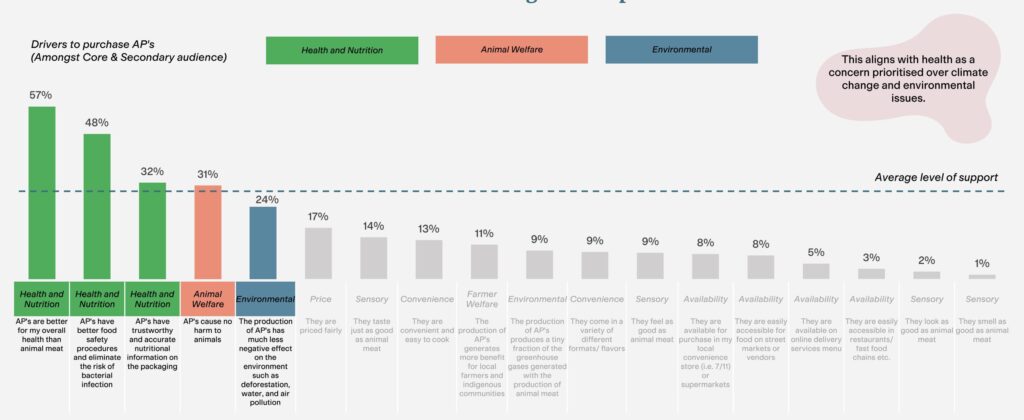
The research pinpointed 18 drivers of consumption of alt-proteins, grouped into eight themes. These were health and nutrition (they’re healthier and safer with accurate nutrition info on packaging), environment (they’re less harmful and emit fewer GHG emissions), farmer welfare (they can benefit local and Indigenous producers more), animal welfare, price, sensory attributes (they taste, feel, look and smell just as good as conventional meat), convenience (they’re easy to cook and come in diverse formats), and availability (they can be found at local stores, supermarkets, street vendors, online services, as well as restaurants).
Health and nutrition were the most influential factors, with 57% finding that alt-proteins are better for their health than animal-derived meat, 48% saying they’re safer and eliminate the risk of bacterial infection, and 32% calling on-pack nutritional info accurate and trustworthy. In contrast, sensory qualities and availability represent the lowest growth drivers for consumption, with only 9% likening their texture to conventional proteins and 8% finding them easily available in convenience stores, supermarkets and street markets. In fact, only 1% and 2% say they smell and look the same as animal proteins, respectively.
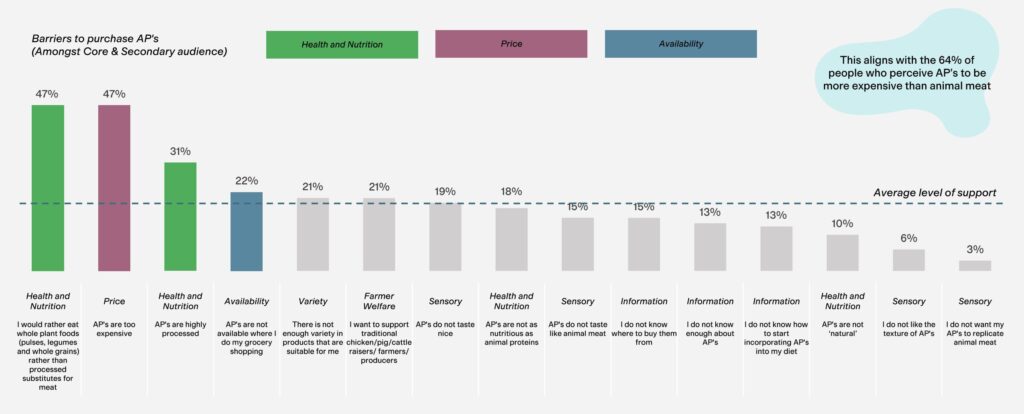
In terms of consumption barriers, the research identified 15 factors grouped into seven categories: health and nutrition (they aren’t as nutritious or natural, are highly processed, or people would rather eat whole plant foods), farmer welfare, lack of information (people don’t know where to buy them, how to incorporate them, or just don’t know enough about them), price, sensory aspects (they don’t taste or feel nice or resemble like conventional meat, or respondents don’t want them to replicate animal proteins), variety, and availability.
Once again, health and nutrition are influential factors – 47% would rather eat plant proteins like pulses, legumes and whole grains, just as 31% find meat alternatives too processed. Price is also a deterrent, with 47% believing they’re too expensive. On the other end of the spectrum, only 3% say they don’t want alternative proteins to replicate their conventional counterparts.
“If alternative proteins can be made cheaper [and] people have easier access, [they] will become part of the menus of a la carte restaurants,” said Chomthongdi. “People who want to eat food that still tastes like meat can order alternative proteins or even mix alternative proteins with meat, which will have better results than eating meat alone.”
Thais support tax cuts for alt-protein
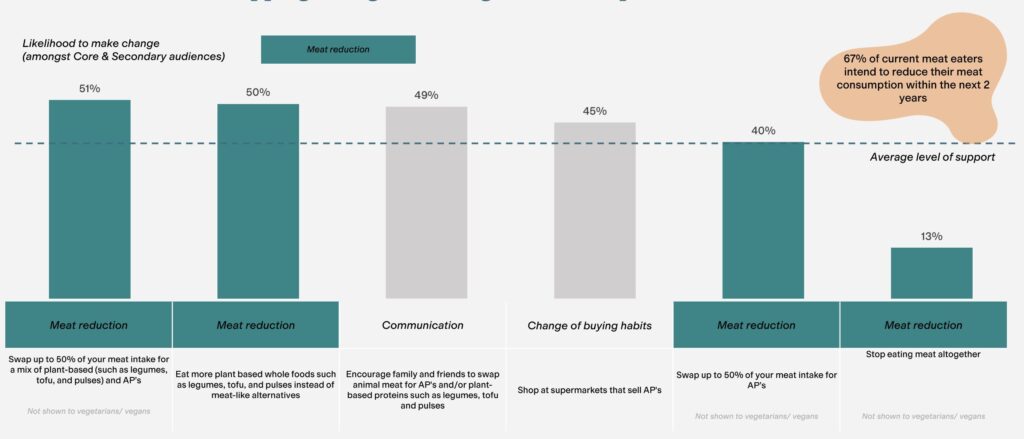
Madre Brava’s research further revealed that meat reduction is much more preferential than elimination altogether. Half of Thai consumers are likely to eat more whole foods or swap 50% of their meat intake with traditional plant proteins and meat alternatives, while 40% would switch half of their meat consumption to alt-protein (which can bring tremendous environmental benefits). In contrast, only 13% say they would completely stop eating meat.
Finally, the survey measured attitudes towards 14 potential policies across five themes. This included regulation of alt-protein production (for major food companies) and consumption (requiring more supermarket/fast-food options, public procurement in schools, and mandating retailers to align with WHO guidelines), consumer awareness (mandatory eco-labelling, national guidelines on climate impact, public education on the harms of industrial meat, and school curriculums on meat and alternatives’ impact), taxation (increased tax on animal meat, reduced levies on alt-proteins), and investment (for alt-protein R&D, farmer transition, and startups and SMEs in the space).
The latter garners strong support from Thai consumers, with 72% and 69% backing investment for farmer transition to new jobs and eco-friendly practices, respectively. A reduced tax on alt-proteins was also supported by 70% of respondents, while a higher surcharge on animal-derived meat was only chosen by 23%. In fact, an increased tax on conventional meat was the most opposed policy intervention, with 71% arguing against it.
“If the government has a policy to seriously support the production of plant-based protein and alternative protein, both for domestic consumption and export, it would be able to correspond with the direction of both the domestic and export markets,” said Chomthongdi.
“Thailand has food technology, and we are a top player in the world, especially when compared to our population and country size,” he added. “Therefore, if you want to develop further in any area, the existing potential should be considered, along with changes and needs at the international level as well.”


